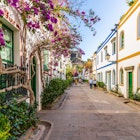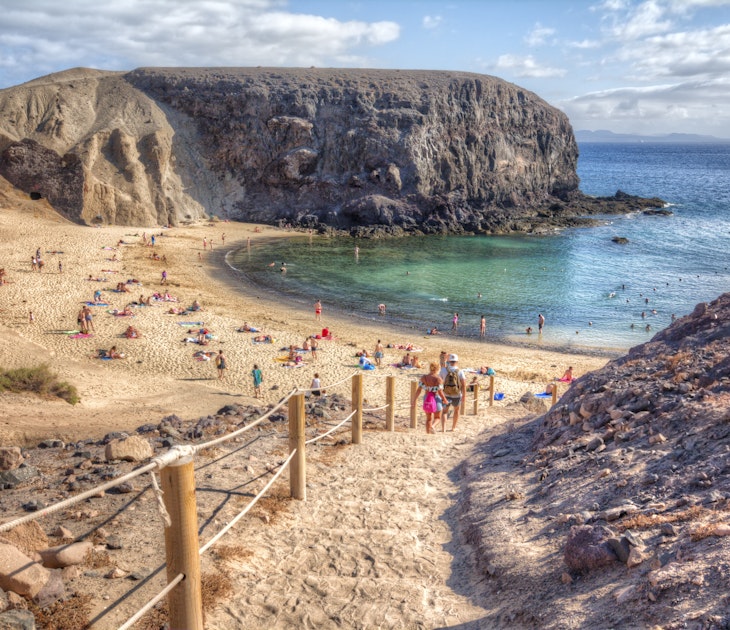
The best times to visit Tenerife for carnival fever and coastal hiking

Jun 15, 2022 • 8 min read

Whether you’re visiting for fiestas, outdoor adventures or lazy beach days, Tenerife provides constant surprises © Thierry Hebbelinck / Getty Images
Once known for its wild all-night parties, Tenerife now enthralls with even wilder landscapes – and a million and one ways to embrace them.
Time your visit right and you can ride massive Atlantic rollers, watch whales, hike through prehistoric laurel forests ripe for a Tolkien fantasy, flop on volcanic beaches and pedal through crater-pocked lunar landscapes with Mt Teide peeking over your shoulder.
Whether you’re coming to Tenerife for fiestas, outdoor adventures or lazy beach days, the island provides constant surprises. Winter is high season for those craving warmth and sunshine, but being so close to North African shores, the weather is pretty reliable year round. Summer turns up the heat, especially when the Saharan Calima winds blow, while spring and fall are perfect for hitting the trail and seeing a calmer, less-crowded side to this crazily popular Canary Island.

Plan a trip in high season to soak up winter sun (December to March; July to August)
Much of Europe might be bundled up in coats and shivering, but Tenerife is closer to the coast of Africa than Spain, and this difference is reflected in mild winter temperatures, which rarely dip below 15ºC (60°F) and sometimes hit a balmy 22ºC (71°F). January is the driest month, with barely any rain, plenty of sunshine and clear blue skies that are a tonic to vitamin D-deprived travelers. The Atlantic is a little chilly this time of year, but the brave still take the plunge.
Bear in mind that south coast resorts are a touch warmer than those in the north, where the weather can be more fickle. You’ll want to pack layers if you’re heading into the mountains or up Pico del Teide, which is often snow-capped in winter. Heavy snow can mean the sudden closure of roads and trails.
Surfers come in winter to ride big rollers on the south coast. Whale watching on the Costa Adeje is terrific. Not only can you see the usual resident pilot whales and dolphins, but you’ll also spot migratory species like fin whales, blue whales and humpbacks. Birdwatchers are also in their element in winter.
Winter is a popular season to visit, particularly in February, when the capital, Santa Cruz de Tenerife, goes wild for Carnaval, with Latino beats, parades, sexy dance moves and skimpy, sparkly costumes. The carnival here is second only to Rio, so expect to see crowds in bigger resorts. You’ll pay top rates for rooms during the Christmas holidays and carnival time.
Crowds also surge in summer, especially during school vacations, and flight prices and room rates soar. The island sizzles in temperatures up to 31ºC (88°F), though Atlantic breezes make the heat tolerable. This is the time for flopping on the beach, swimming, kitesurfing and windsurfing at El Médano. The island flicks into fiesta and music-festival mode, and south-coast resorts ramp up their party scene.
For festivals, visit during shoulder season (April to June)
Spring is when Tenerife takes a breather. Except during Easter, you can find bargain flights and hotels, and things are generally quieter. It’s a glorious time to see the peaks, valleys and gorges lushly green and freckled with wildflowers in mountainous areas like Anaga, Parque Nacional del Teide and Parque Rural de Teno in the island’s rugged north.
Days are warming up, with highs of up to 23ºC (73°F), taking the chill off the sea. You can expect occasional showers, but these tend to blow over quickly. Shoulder season is a great time to cycle, scuba dive, paraglide above volcanic landscapes and strike out on mountain-to-coast trails like the Barranco de Masca.
Low season is the best time for quiet exploration (September to November)
At times, you’ll feel as though you have Tenerife all to yourself in fall. The crowds of summer have fizzled out, and room rates are dropping. Flights might be less frequent, but if you’re flexible, you can snap up some good deals. September is still pretty hot, with highs around 27ºC (80°F), and the Atlantic has had all summer to warm up.
It’s a fine month for exploring, so combine the coast with hikes in the mountains, wine tasting at inland bodegas and culture in Santa Cruz de Tenerife and the historic center of Unesco World Heritage La Laguna.
Bring waterproof clothing or an umbrella in October, Tenerife’s rainiest month by far. (Given how wonderfully quiet the island is at this time, you can forgive it the odd downpour.) The surfing season lasts from September to April.

January is for whale watching and big waves
Blue skies delight winter sun-seekers. January is the driest month, and the beaches buzz with travelers topping up their tans (not locals: they're the ones wearing padded coats!). Come for whale watching and big waves. Christmas festivities spill over into the new year at DÃa de los Reyes Magos (Three Kings Day) on January 6, with parades and presents in resorts like Santa Cruz, Garachico and Los Cristianos. The architecturally striking Auditorio de Tenerife reverberates to classical music.
Key events: DÃa de los Reyes Magos,
February's scene is all about Carnaval
Ay ay ay! The whole island goes mad for Carnaval in February, with glittering parades, parties and samba beats that bring Rio to the capital Santa Cruz. Book far in advance to reserve a room. Puffed white with almond blossom, the island looks gorgeous. Hike the that starts in Santiago del Teide to see it at its blooming best.
Key events: Carnaval
March has great weather sans crowds
Tenerife is coming into flower and warming up in March, making this a great time for uncrowded beach days or backcountry hikes and bike rides. Folk concerts bring Canarian culture to life in south coast Arona.
Key events:
In April, prices spike around Easter
Semana Santa (Holy Week) brings emotive religious processions to traditional towns and villages like La Laguna, GüÃmar and La Orotava. April is overall a quiet month, but room rates and visitor numbers spike around Easter. You’ll get the odd showery or cloudy day, but also plenty of sun.
Key events:
May is lovely and often overlooked
One of the loveliest, most-overlooked months on Tenerife, May is mostly sunny and dry, ideal for planning outdoor escapades or just crashing on the nearest beach. Cafe and restaurant terraces hum as the evenings get warmer. Santa Cruz de Tenerife throws a huge May festival, with balls, pageants and food and craft fairs. The highlight is DÃa de la Cruz (Holy Cross Day) on May 3, with parades and costumed parties.
Key events: Fiestas de Mayo,

Summer swings into gear in June
Spring eases into summer in June, with higher temperatures, lots of sunshine and refreshingly few crowds. Puerto de la Cruz celebrates San Juan (St John) on June 23, with all-night beach parties, barbecues, bonfires, fireworks and music. The town of La Orotava is carpeted in elaborate tapestries of flowers and sand for Corpus Christi.
Key events: Fiestas de San Juan, Corpus Christi
Fiesta season touches down in July
It’s peak summer, and hot days mean you’ll want to be close to the coast or in the cool of the mountains in July. Visitor numbers (and room rates) surge when school is out. This is fiesta season, with festivals swinging from music to dance and film to folk. Puerto de la Cruz celebrates the Virgen del Carmen, the patron saint of fishermen and sailors, with maritime processions on July 16.
Key events: Virgen del Carmen,
Temperatures hit their peak in August
The island buzzes with people and parties in August, when temperatures peak, regularly hitting 30ºC (86°F). It’s time to head for the playa (beach), but don’t expect much towel space. Flights are pricey, and rooms are at a premium.
The events calendar is jam-packed. Pro windsurfers catch breezes at the PWA World Cup in El Médano. Take a deep dive into the island’s culture at festivals like the Fiesta de la Virgen de la Candelaria, which honors the island’s patron saint with mid-month pilgrimages and parades.
Key events: Fiesta de la Virgen de la Candelaria,

September is peaceful, with stable weather
Summer lingers, and the Atlantic is nice and warm for swimming in September. It’s a peaceful month and one of the best for hiking and cycling, with the weather still stable. September is harvest time, and many farmers are busy picking almonds, figs and grapes. La Laguna is festival central, with its Fiesta del SantÃsimo Cristo staging parades, parties, Canarian wrestling and big-bang fireworks, and folk music concerts at the Sabandeño Festival. Opera season is starting.
Key events: Fiesta del SantÃsimo Cristo
Pack an umbrella in rainy October
October is the wettest month in Tenerife, but don’t let that put you off: temperatures can still creep up to a very pleasant 26ºC (79°F), though nights are cooler. It’s a quiet month for rambles into the mountains or along the coast. In the island's west, the village of Aripe holds a fair to celebrate the almond harvest.
Key events: Tenerife Opera Festival
November is the calm before the holiday storm
November is true low season, and tourism slows to a trickle, a breath of calm before the Christmas festivities. The north can be cloudy, but days are still warm, making this a great month for a winter-sun fix before the big crowds rock up. It’s a month of feasting: cheese, chestnuts and, at the end-of-month Fiesta de San Andrés (Festival of St Andrew), new wine in Puerto de la Cruz and La Orotava. Icod de los Vinos holds the wacky Tablas, where locals race down the town’s steep streets on greased wooden boards.
Key events: Fiesta de San Andrés
December brings festive cheer
December is full of festive sparkle, fiestas and fireworks. The price of flights, hotels and crowds shoots up as travelers flock here for Navidad (Christmas) and Nochevieja (New Year’s Eve).
Key events: Puertos de Tenerife Christmas concert
Explore related stories





 Festivals & EventsThe best time to visit Puerto Rico for festivals, beaches, pernil and more
Festivals & EventsThe best time to visit Puerto Rico for festivals, beaches, pernil and moreSep 12, 2024 • 8 min read




